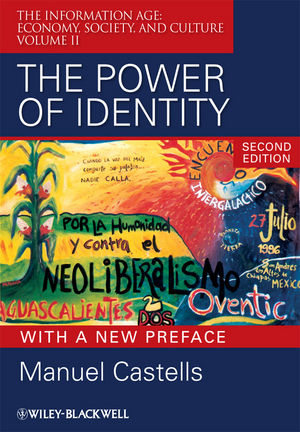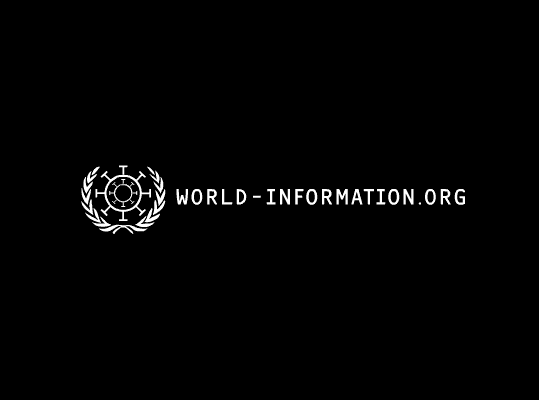Manuel Castells: The Power of Identity: The Information Age: Economy, Society, and Culture, 2nd ed. (2009)
Filed under book | Tags: · economy, globalisation, identity, information society, network culture, networks, politics, social movements, technology, terrorism, women

In this second volume of The Information Age trilogy, with an extensive new preface following the recent global economic crisis, Manuel Castells deals with the social, political, and cultural dynamics associated with the technological transformation of our societies and with the globalization of the economy.
* Extensive new preface examines how dramatic recent events have transformed the socio-political landscape of our world
* Applies Castells’ hypotheses to contemporary issues such as Al Qaeda and global terrorist networks, American unilateralism and the crisis of political legitimacy throughout the world
* A brilliant account of social, cultural, and political conflict and struggle all over the world
* Analyzes the importance of cultural, religious, and national identity as sources of meaning for people, and its implications for social movement
* Throws new light on the dynamics of global and local change
Publisher John Wiley and Sons, 2009
Information Age Series, Manuel Castells
ISBN 1405196874, 9781405196871
Length 584 pages
Sarai Readers 01-07 (2001-2007)
Filed under book | Tags: · city, community, community art, everyday, human rights, india, media, network society, politics, public domain, technology, urbanism

Sarai Reader 07: Frontiers, 2007
Frontiers considers limits, edges, borders and margins of all kinds as the sites for declarations, occasions for conversations, arguments, debates, recounting and reflection. Our book suggests that you consider the frontier as the skin of our time and our world and we invite you to get under the skin of contemporary experience in order to generate a series of crucial (and frequently unsettling) narrative and analytical possibilities.
We have always viewed the Sarai Reader as hospitable to new and unprecedented ideas, as a space of refuge where wayward reflections can meet half forgotten agendas. we hope our text this year sets the stage for a productive encounter with the demand for an account of the boundaries, parameters and verges of our times.
Editors: Monica Narula, Shuddhabrata Sengupta, Jeebesh Bagchi, Ravi Sundaram
Associate Editor: Smriti Vohra

Sarai Reader 06: Turbulence, 2006
Sarai Reader 06 uses ‘Turbulence’ as a conceptual vantage point from which to interrogate all that is in the throes of terminal crisis, and to invoke all that is as yet unborn. It seek to examine ‘turbulence’ as a global phenomenon, unbounded by the arbitrary lines that denote national and state boundaries in a ‘political’ map of the world. It wants to see areas of low and high pressure in politics, economy and culture that transcend borders, to investigate the flow of information and processes between downstream and upstream sites in societies and cultures globally.
Editors: Monica Narula, Shuddhabrata Sengupta, Ravi Sundaram, Jeebesh Bagchi, Awadhendra Sharan + Geert Lovink
Associate Editor: Smriti Vohra

Sarai Reader 05: Bare Acts, 2005
‘Bare Acts’ looks at ‘Acts’- at instruments of legislation, at things within and outside the law, and at ‘acts’ – as different ways of doing things in society and culture. The Reader foregrounds explorations of borders, surveillance, claims to authority and entitlement, the legal regulation of sexuality and trespasses of various kinds.
Editors: Monica Narula, Shuddhabrata Sengupta, Jeebesh Bagchi + Geert Lovink
Guest Editor: Lawrence Liang
Associate Editor: Smriti Vohra

Sarai Reader 04: Crisis / Media, 2004
The 2004 Reader produced by Sarai, is devoted to the dual themes of crisis reporting in the media, and the crisis within the media when it comes to the reportage of violence. Crisis pervades the times we live, and becomes palpable entity in itself. To acknowledge the pervasiveness of the crisis in our times, is also to engage with the media through which crisis, and the representation of crisis, become the ‘substance of our morning’s meditations’.
Editorial collective: Shuddhabrata Sengupta, Monica Narula, Ravi Vasudevan, Ravi Sundaram, Jeebesh Bagchi & Awadhendra Sharan [Sarai] + Geert Lovink

Sarai Reader 03: Shaping Technologies, 2003
“Shaping Technologies ” sets out to ratchet our engagement with the contemporary moment a notch higher, in directions that are sober, exhilarating and discomfiting, all at once. The book brings to the fore a series of situations and predicaments that mark the encounter between people and machines, between nature and culture, and between knowledge and power.
Editorial collective: Ravi Vasudevan, Ravi Sundaram, Jeebesh Bagchi, Monica Narula, Shuddhabrata Sengupta [Sarai], Geert Lovink, Marleen Stikker [Waag]

Sarai Reader 02: The Cities of Everyday Life, 2002
This year’s Sarai Reader brings together a range of critical thinking on urban life and the contemporary, marked by spreading media cultures, new social conflict and globalisation. Scholars, media practitioners, critics and activists use a flow of images, memories and hidden realities to create a fascinating array of original interventions in thinking about cities today. In the context of India, where a large part of this reader has been edited, this is significant, given the frugality of writing on city life in this part of the world.
Editors: Ravi Vasudevan, Ravi Sundaram, Jeebesh Bagchi, Monica Narula, Geert Lovink, Shuddhabrata Sengupta

Sarai Reader 01: The Public Domain, 2001
Sarai Reader 01, (which is the first of what we hope will be more such collections) can be seen both as a navigation log of actual voyages and a map for possible journeys into a real and imagined territory that we have provisionally called the “Public Domain”. This republic without territory is a sovereign entity that comes into being whenever people gather and begin to communicate, using whatever means that they have at hand, beyond the range of the telescope of the merchant, and outside the viewing platform of the microscope of the censor.
Editors: Raqs Media Collective (Sarai) + Geert Lovink (Waag)
Produced at the Sarai Media Lab, Delhi
Comments Off on Sarai Readers 01-07 (2001-2007)World-Information: Special IP Edition & IP City Edition (2003, 2005)
Filed under magazine | Tags: · democracy, digital human rights, human rights, media activism, politics, technology

World-Information.Org is a trans-national cultural intelligence provider, a collaborative effort of artists, scientists and technicians. It is a practical example for a technical and contextual environment for cultural production and an independent platform of critical media intelligence. Through artistic and scientific exploration of information and communication technologies World-Information.Org disseminates an understanding of their cultural, societal and political implications, and fosters future cultural practice. World-Information.Org is an agent of digital democratisation and the pursuit of digital human rights. Enlightening the opportunities, challenges and risks of information and communication technology, World-Information.Org provides information necessary for a democratic development of society, culture and politics.
Special IP Edition
World Summit on the Information Society, Geneva, 10-12 December 2003
Editors: Eva Pressl, Wolfgang Suetzl
Concept: Konrad Becker, Felix Stalder
Production: Wolfgang Brunner
Published by World-Information.Org, Vienna
Creative Commons Attribution-ShareAlike 1.0 License
PDF, PDF (updated on 2017-12-3)
IP City Edition
World Summit on the Information Society, Tunis, 16-18 November 2005
World-Information City, Bangalore, 14-20 November 2005
Editors: Wolfgang Suetzl, Christine Mayer
Concept: Konrad Becker, Felix Stalder
Production: Andrea Ressi
Published by World-Information.Org, Insitute for New Culture Technologies/t0 Netbase, Vienna
Creative Commons Attribution-ShareAlike 2.5 License
PDF, PDF (updated on 2017-12-3)
Comment (0)
